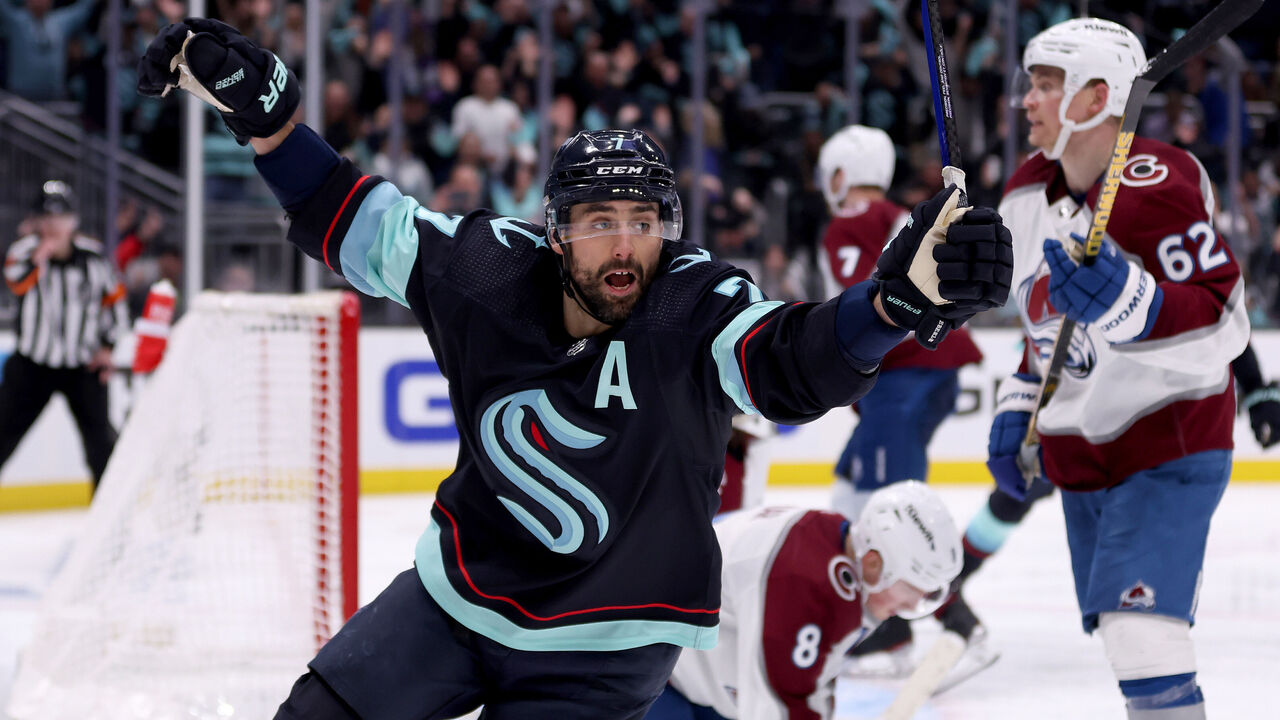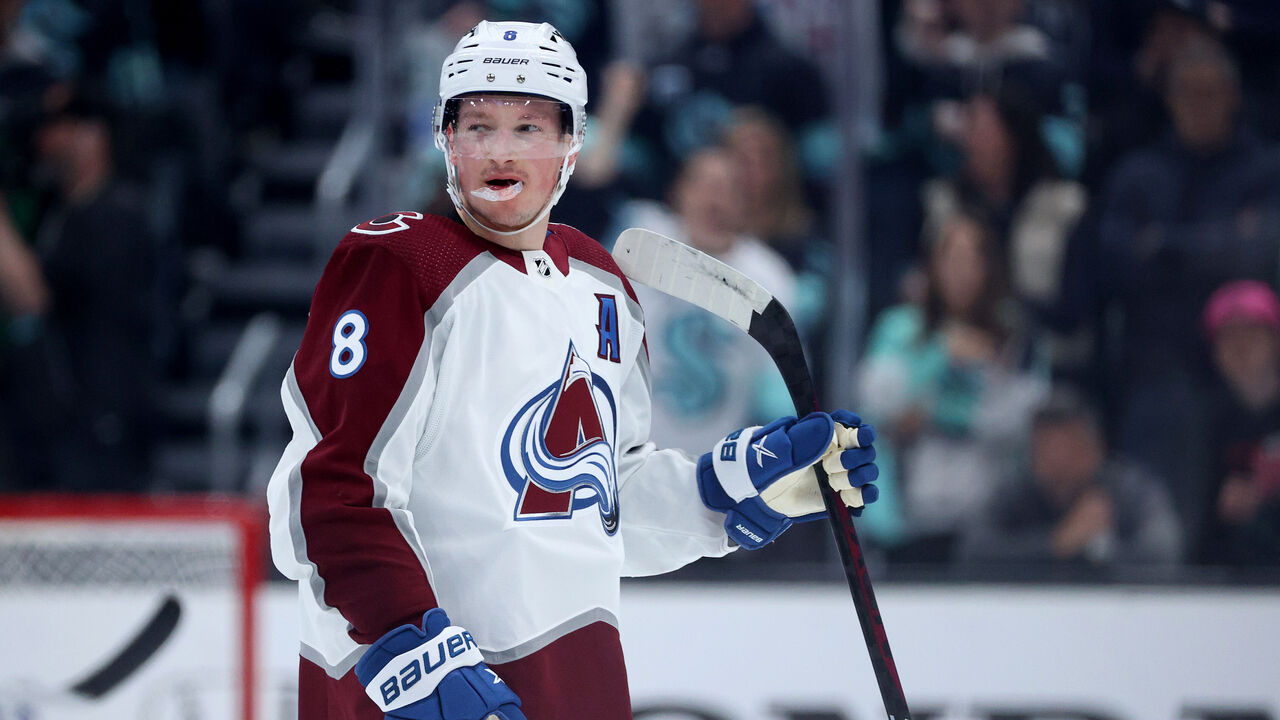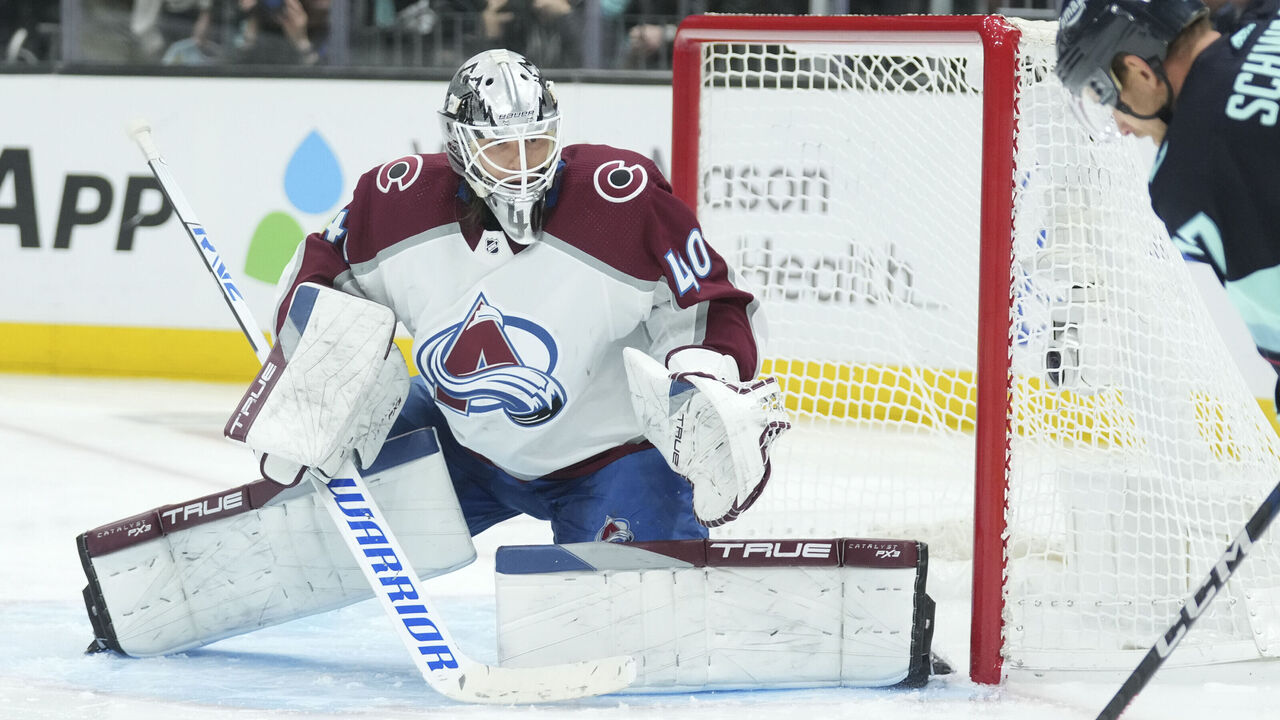Can the Avalanche sink pesky Kraken and mount another Stanley Cup run?
The Seattle Kraken edged the Colorado Avalanche 3-2 in overtime on Monday to square their first-round playoff matchup at two wins apiece. These three questions will shape the Avalanche's fate in the series and determine how close they come to repeating as Stanley Cup winners.
Can Avalanche score first and often?

Certain pillars of the Avalanche's 2022 Cup team either signed elsewhere last summer (Nazem Kadri, Andre Burakovsky) or missed the full year recovering from knee surgery (captain Gabriel Landeskog). The Avs reigned atop the Central Division anyway, despite scoring 32 fewer goals than last season.
Colorado's offense was electric in the '22 playoffs. The Avalanche potted 4.25 goals per game over 20 matchups, the most by a team whose run lasted that long since the 1983 New York Islanders. They outscored the Nashville Predators 21-9 in the first-round sweep that initiated the onslaught.
Seattle's a pluckier opponent, but Colorado's big guns came to play. The forwards who log the heaviest minutes - Mikko Rantanen, Nathan MacKinnon, J.T. Compher, Artturi Lehkonen, and Valeri Nichushkin (who remains out for personal reasons) - have bagged 10 of the club's 12 goals to date. Rantanen's Game 4 equalizer was his fifth tally of the series and ended the Avalanche power play's protracted drought. Of course, Jordan Eberle's power-play goal for the Kraken in overtime was bigger.

Winning offensive-zone faceoffs has sparked the Avalanche at times. Lehkonen and Devon Toews scored off draws to power Colorado's Game 2 comeback. Alex Newhook, a 38.6% faceoff taker for his career, snapped one back to tee up Cale Makar's missile from the point in Game 3. Colorado only controlled 44% of the draws in Game 4, a series low.
Per Natural Stat Trick, MacKinnon leads the series in shots and individual scoring chances, predictably establishing himself as a force. He paced all NHL regulars this season in five-on-five scoring per 60 minutes, producing 3.28 points (for context, Connor McDavid's per-60 rate was 2.71). Outshot 43-22 on Monday, the Avalanche didn't drum up any momentum until MacKinnon's sweet backhand feed helped Rantanen score off the rush.
Colorado's depth diminished up front when Kadri and Burakovsky departed, and Landeskog was shelved. The main cast remained formidable through the rash of injuries that sidelined MacKinnon, Lehkonen, Nichushkin, Makar, and Bowen Byram for weeks at a time. Makar is suspended for Game 5 on Wednesday because he interfered with and injured Kraken sniper Jared McCann.
The Avs scored the first goal in an NHL-high 54 games this season, posting an .824 points percentage in those contests. Pouring it on early and consistently is how they'll contend for the Cup again. Credit the Kraken, who've wrongfooted Colorado by striking first in all four games.
Can Avs manage puck in the D-zone?

Puck-movers abound on Colorado's back end. Makar is a wizard, Toews' decision-making is sound, and Byram and Samuel Girard are renowned for their mobility. Despite this strength, careless puckhandling has stung the Avalanche every time they've started slow in the series and dug a two-goal hole.
Many Seattle tallies have stemmed from failed Colorado breakouts, takeaways in the Avalanche zone, or bounces the Avs mishandled behind the net. A few minutes into Game 4, Rantanen's blind back pass wound up on Brandon Tanev's stick, and Will Borgen promptly wired a one-timer over Alexandar Georgiev's mitt.
The Kraken's offensive approach is no-nonsense. They lack superstar creators but send pucks deep, forecheck doggedly, win one-on-one battles, and attack downhill in transition. That happened in overtime Monday when Lars Eller's offensive-zone turnover enabled Jaden Schwartz to race behind two Colorado defenders and compel Josh Manson to trip him.
Seattle's finishing ability is elite, but the stupendous goals in this matchup - both MacKinnon's breakaway burst and undressing of Ryan Donato in Game 3 come to mind - largely belong to the Avalanche. Conjuring highlights is their domain. Taking greater care of the puck would limit glorious chances against and help spring Colorado's stars up ice.
Can Georgiev shut the door?

Last spring, Darcy Kuemper's .902 postseason save percentage was high enough for him to win the Stanley Cup. He saved minus-7.29 goals above expected in the playoffs, per Evolving-Hockey. Injured in multiple rounds, Kuemper ceded the net at points to backup Pavel Francouz. Colorado was the rare champion that never needed its starting goalie to dominate.
Signed to succeed Kuemper, Georgiev's save percentage has slipped from .919 over 62 regular-season starts to .908 so far against the Kraken.
That said, he's been dependable at key junctures. Georgiev thwarted Yanni Gourde's breakaway attempt and Eberle's odd-man chance in Game 2 with huge pad saves, keeping the Avalanche afloat when they trailed in the series. He stoned McCann in Game 4 a beat before Makar rammed the Kraken forward into the boards. Georgiev saved 29 consecutive shots and denied 40 overall before Eberle struck in sudden death.
Philipp Grubauer's .895 save percentage this season was poor, but the Kraken netminder has experience shining in the clutch. Grubauer foiled shots at a .920 rate over 29 playoff starts for Colorado from 2019-21. Georgiev was the busier and better goalie on Monday, a silver lining he'll have to duplicate to submerge Seattle.
Nick Faris is a features writer at theScore.
HEADLINES
- Slovakia in line to win Group B after late goal in loss to Sweden
- 5 key takeaways from Canada's hard-fought victory over Switzerland
- Report: Fiala to have season-ending surgery after Olympic injury
- Canada's Morrissey won't play vs. France, not ruled out of Olympics
- McDavid, MacKinnon shine in Canada's win over Swiss